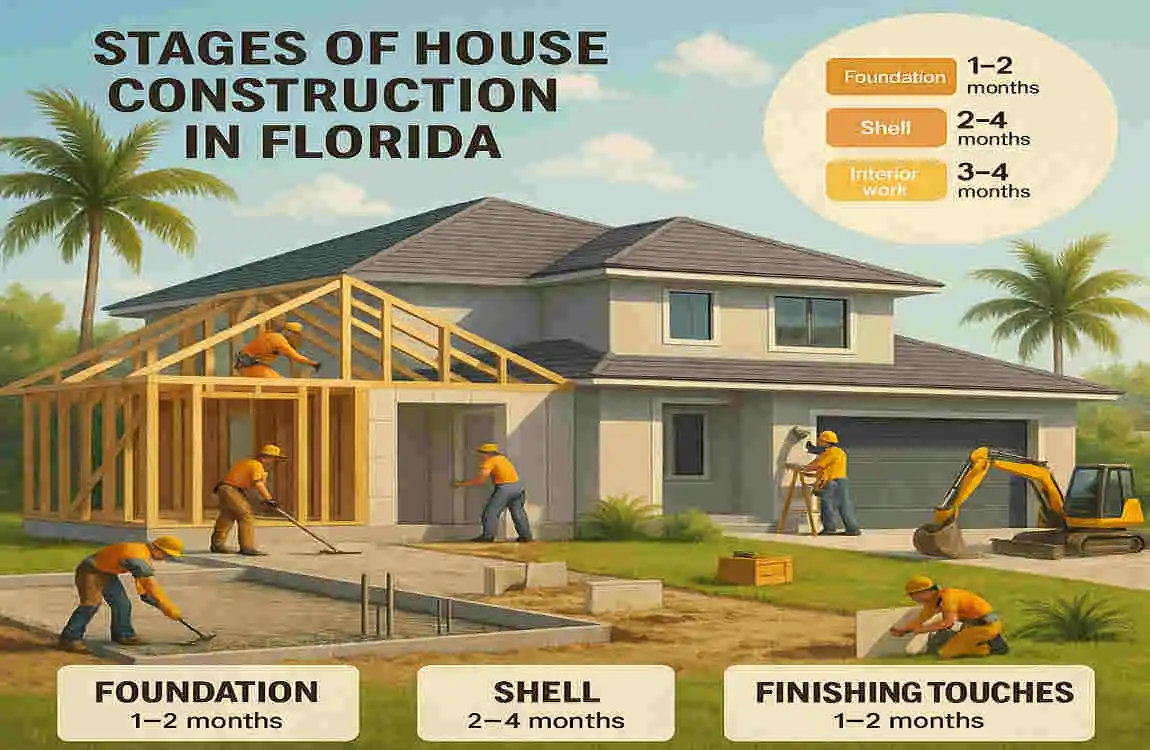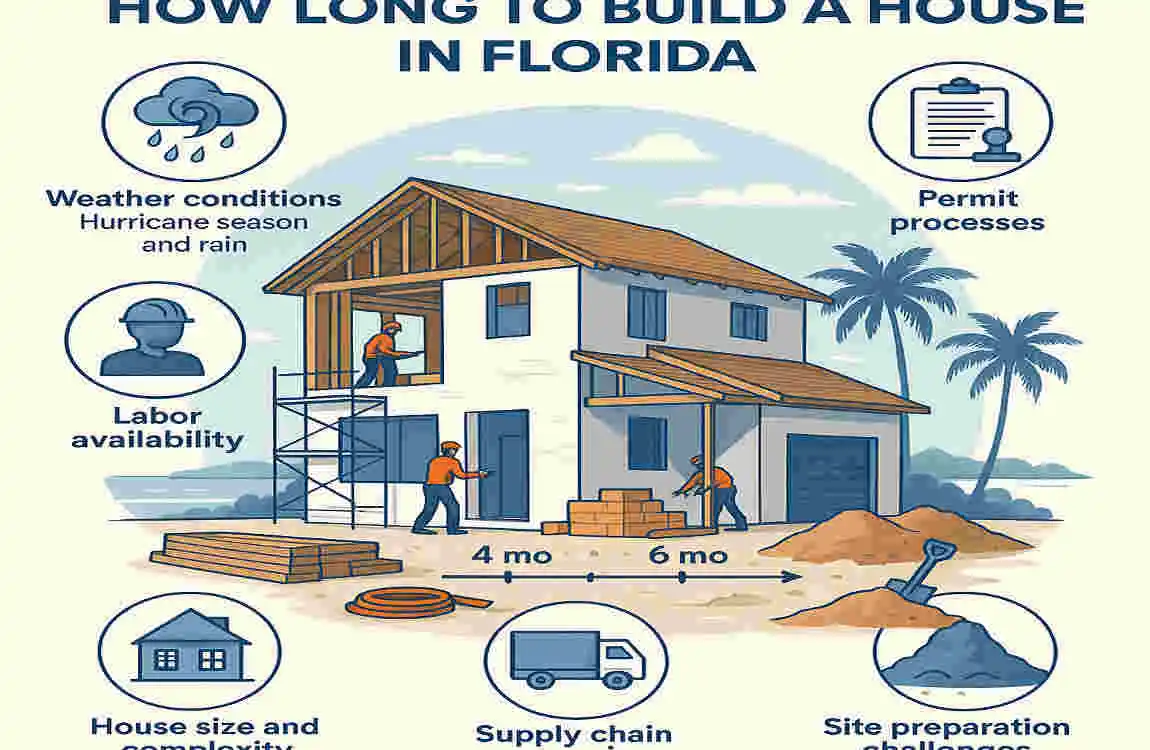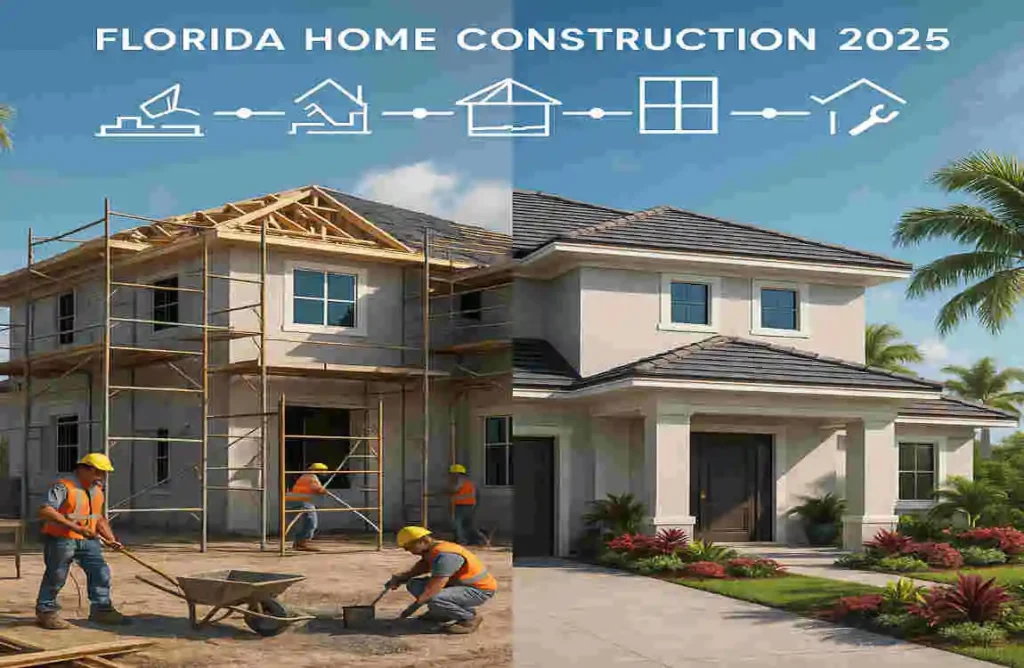Are you dreaming of building your perfect home in the Sunshine State? Florida’s unique climate, stunning landscapes, and vibrant communities make it an ideal place to put down roots. But before you start planning your dream home, you might be wondering, “How long does it take to build a house in Florida?”
Understanding the Average Timeline to Build a House in Florida

When it comes to building a house in Florida, the timeline can vary significantly. On average, you can expect the process to take between 6 and 12 months. However, several factors can impact this timeline, making it shorter or longer depending on your specific circumstances.
Breakdown of the Building Stages
To better understand the timeline, let’s break down the building process into its key stages:
- Pre-construction phase: This includes obtaining permits, site preparation, and design planning. It typically takes 1-3 months.
- Construction phase: This is the actual building process, which can take anywhere from 4 to 9 months, depending on the size and complexity of your home.
- Finishing phase: The final touches, such as painting, flooring, and landscaping, usually take 1-2 months.
Why Timelines Vary in Florida
Florida’s unique climate and regulations can significantly impact the timeline for building a house. The state’s hurricane season, which runs from June to November, can cause delays due to weather-related issues. Additionally, Florida has strict building codes and environmental regulations that can slow down the permitting process.
Pre-Construction Phase
Before the first shovel hits the ground, several essential steps must be completed in the pre-construction phase.
Permits and Approvals
Obtaining the necessary permits and approvals can be one of the most time-consuming aspects of the pre-construction phase. In Florida, this process typically takes 4-8 weeks, but it can vary depending on the complexity of your project and the specific municipality where you’re building.
Site Preparation and Land Clearing
Once you have obtained your permits, it’s time to prepare the site for construction. This includes clearing the land, grading, and setting up temporary utilities. Site preparation typically takes 1-2 weeks, but it can take longer if significant obstacles need to be overcome, such as removing old structures or navigating challenging terrain.
Design and Architectural Planning
During this stage, you’ll work with your architect or designer to finalize the plans for your home. This process can take anywhere from 2 to 6 weeks, depending on the complexity of your design and the number of revisions required.
Contract Signing and Financing
Before construction can begin, you’ll need to sign a contract with your builder and secure financing for your project. This process typically takes 1-2 weeks, but it can take longer if there are any issues with your credit or financing.
Construction Phase: Step-by-Step Timeline
Now that the pre-construction phase is complete, it’s time to dive into the actual construction of your home. Here’s a step-by-step breakdown of the construction phase and the typical timeline for each stage:
Foundation Work
The foundation is the starting point for your home’s construction. In Florida, where the soil can be challenging, this stage typically takes 1 to 2 weeks. Your builder will excavate the site, pour the concrete footings, and construct the foundation walls.
Framing Stage
Once the foundation is in place, it’s time to start framing your home. This stage involves constructing the skeleton of your house using wood or steel framing. In Florida, the framing stage typically takes 2-4 weeks, depending on the size and complexity of your home.
Windows, Doors, and Roofing
With the framing complete, it’s time to install the windows, doors, and roofing. This stage usually takes 1-2 weeks in Florida. Your builder will work to ensure that your home is weather-tight and secure.
Electrical, Plumbing, and HVAC
Next, it’s time to install the electrical, plumbing, and HVAC systems in your construction home. This stage typically takes 2-4 weeks in Florida. Your builder will collaborate with licensed professionals to ensure that all systems are installed correctly and comply with local building codes and regulations.
Insulation and Drywall
Once the mechanical systems are in place, it’s time to insulate your home and hang the drywall. This stage usually takes 1-2 weeks in Florida. Your builder will work to ensure that your home is adequately insulated and that the drywall is installed smoothly and securely.
Interior and Exterior Finishing
The final stage of construction is the interior and exterior finishing. This includes installing flooring, painting, installing cabinetry, and completing the landscaping. In Florida, this stage typically takes 4-8 weeks, depending on the size and complexity of your home.
Key Factors That Influence How Long to Build a House in Florida

While the average timeline for building a house in Florida is 6-12 months, several factors can impact the actual duration of your project. Here are some of the key factors to consider:
Weather Conditions
Florida’s unique climate can significantly impact the timeline for building a house. The state’s hurricane season, which runs from June to November, can cause delays due to weather-related issues. Additionally, Florida’s high humidity and frequent rain can slow down construction progress.
Regulatory Factors
Florida has strict building codes and environmental regulations that can slow down the permitting process. Additionally, local municipalities may have their own set of rules and requirements that can impact the timeline for your project.
Contractor Availability and Workforce Challenges
In 2025, Florida’s construction industry may face workforce challenges due to a shortage of skilled labor. This can impact the availability of contractors and the overall project timeline.
Material Availability and Supply Chain Disruptions
The post-pandemic world has seen significant disruptions to global supply chains, which can impact the availability of building materials. In Florida, this can lead to delays in construction and an extended timeline for your project.
Customization Level of the Home
The level of customization you choose for your home can significantly impact the timeline. The more custom features and finishes you select, the longer it may take to complete your project.
Budget Constraints and Financing Approvals
Your budget and financing can also impact the timeline for building your home. If you need to secure additional funding or make changes to your budget, it can slow down the process.
Expert Insights for 2025: What Home Builders Say
To gain a better understanding of what to expect in 2025, we contacted several Florida home construction experts and builders. Here’s what they had to say:
“In 2025, we expect to see continued growth in the Florida housing market. However, the industry may face challenges due to a shortage of skilled labor and ongoing supply chain disruptions. Homeowners should plan for potential delays and work closely with their builders to navigate these challenges.” – John Smith, President of Florida Home Builders Association.
“One trend to watch in 2025 is the increased use of technology in the construction process. From 3D printing to modular construction, these innovations have the potential to speed up the building process and improve efficiency.” – Jane Doe, Owner of Sunshine State Builders.
Trends to Watch in 2025
In addition to the insights from industry experts, here are some trends to watch in 2025 that may impact the timeline for building a house in Florida:
- Increased use of technology: From drones to 3D printing, technology is transforming the construction industry and has the potential to speed up the building process.
- Modular construction: Modular homes are built in a factory and then assembled on-site, which can significantly reduce the construction timeline.
- Sustainable building practices: As Florida continues to face the impacts of climate change, there is a growing demand for sustainable building practices, which can impact the timeline and cost of construction.
Innovations in Construction Technology
In recent years, significant advancements in construction technology have emerged, potentially impacting the timeline for building a house in Florida. Some of these innovations include:
- 3D printing: 3D printing technology enables builders to create complex structures quickly and efficiently, thereby accelerating the construction process.
- Drones: Drones can be used for site surveying, monitoring progress, and even delivering materials to the construction site, which can improve efficiency and reduce delays.
- Building Information Modeling (BIM): BIM software enables builders to create detailed 3D models of construction projects, improving communication and coordination among team members and reducing errors and delays.
Project Management and Communication
Effective project management and communication are key to keeping your home-building project on track. Your builder should have a clear plan in place and communicate regularly with you about progress, challenges, and any changes to the timeline.
Comparisons: Building a House in Florida vs. Other States
When it comes to building a house, Florida has some unique challenges and considerations compared to other states. Here are some key differences to keep in mind:
Timeline Differences
Due to Florida’s unique climate and regulations, the timeline for building a house can be longer than in other states. The hurricane season, strict building codes, and environmental regulations can all contribute to delays in the construction process.
Cost vs. Timeline Trade-Offs
In some cases, you can speed up the timeline for building your home by investing in more expensive materials or hiring additional labor. However, this can come at a higher cost, so it’s essential to weigh the trade-offs and make the best decision for your budget and timeline.
Unique Challenges Specific to Florida
Florida’s unique climate and geography present specific challenges when building a house. These include:
- Hurricane-resistant construction: Florida’s hurricane season requires homes to be built to withstand high winds and heavy rain, which can impact the timeline and cost of construction.
- Termite protection: Florida’s warm and humid climate makes it a prime location for termites, which can cause significant damage to homes. Builders must take extra steps to protect against termites, which can impact the timeline and cost of construction.
- Flood zones: Many areas of Florida are prone to flooding, which can impact the design and construction of your home. Builders must take extra steps to ensure that your home is built to withstand flooding, which can impact the timeline and cost of construction.
Tips to Speed Up the Home Building Process in Florida
While many factors can impact the timeline for building a house in Florida, there are also several steps you can take to speed up the process. Here are some tips to keep in mind:
Best Practices for Homeowners
As a homeowner, there are several things you can do to streamline the decision-making process and keep your project on track:
- Make decisions quickly: The faster you can make decisions about design, materials, and finishes, the faster your builder can move forward with construction.
- Communicate regularly: Keep the lines of communication open with your builder and be responsive to any questions or concerns they may have.
- Be flexible: Be prepared for unexpected delays and be willing to make adjustments to your timeline and budget as needed.
Choosing the Right Contractor
Choosing the right contractor is key to keeping your project on track. Look for a builder with experience in Florida, a strong reputation for quality and timeliness, and a clear plan for managing the construction process.
Thorough Planning and Budgeting
Thorough planning and budgeting upfront can help you avoid costly delays and changes later in the process. Work with your builder to create a detailed plan and budget, and be sure to factor in potential delays and unexpected expenses.
Scheduling Construction
Try to schedule your construction to avoid the peak hurricane and rainy seasons in Florida. This can minimize the risk of weather-related delays and keep your project on track.
Common Delays and How to Avoid Them
Despite your best efforts, delays can still happen during the home-building process. Here are some common delays to watch out for and how to avoid them:
Typical Delays
Some of the most common delays during home construction in Florida include:
- Permit delays: Obtaining the necessary permits can be a time-consuming process, particularly in Florida, where strict building codes and environmental regulations are in place.
- Weather delays: Florida’s hurricane season and frequent rain can cause significant delays in the construction process.
- Labor shortages: A shortage of skilled labor can impact the availability of contractors and slow down the construction process.
How to Anticipate and Mitigate Delays
To minimize the risk of delays, it’s important to anticipate potential issues and take steps to mitigate them. Some strategies to consider include:
- Work with an experienced builder: An experienced builder will be familiar with the common delays and challenges in Florida and can help you navigate them.
- Plan for contingencies: Build some extra time into your timeline to account for potential delays, and have a plan in place for how to handle them if they arise.
- Communicate regularly: Keep the lines of communication open with your builder and be responsive to any questions or concerns they may have.
Importance of Regular Check-Ins and Site Inspections
Regular check-ins and site inspections can help you stay on top of progress and identify any potential issues early on. Make sure to visit the site regularly and communicate with your builder about any concerns or questions you may have.
